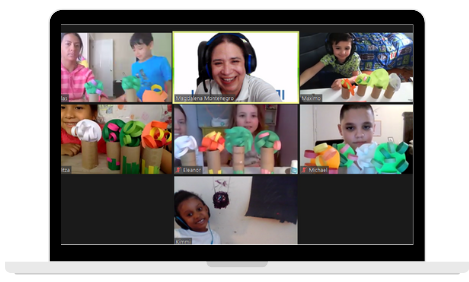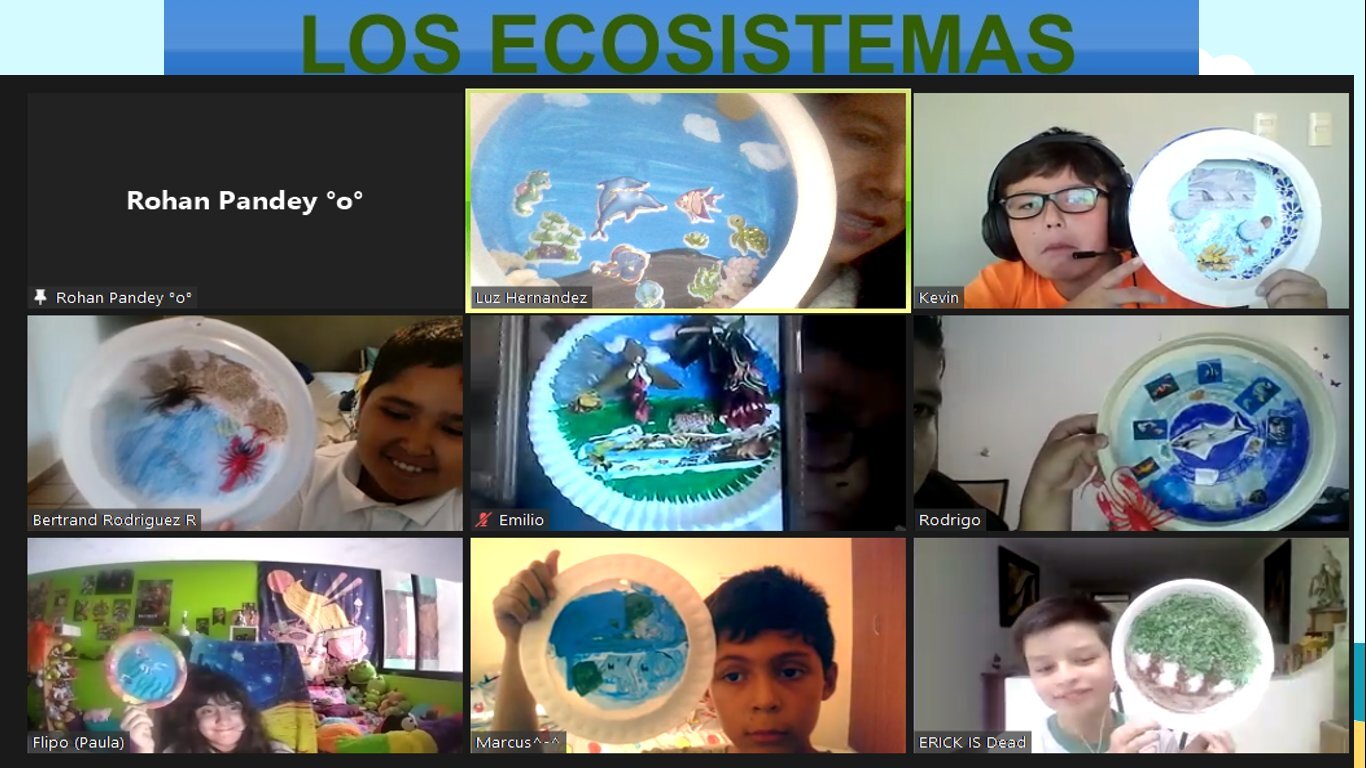
As a parent in today’s fast-paced and digitally driven world, you may find yourself at the crossroads of education choices, especially when it comes to homeschooling. Online homeschooling has swiftly moved from a niche educational alternative to a popular and viable option for families across the globe. In this ever-evolving landscape, it’s not just about deciding to homeschool, but understanding how to effectively navigate this journey for children of different ages.
Each age group brings its own set of unique challenges and opportunities in an online homeschool setting. (source: Homeschooling Different Age Groups: Strategies and Challenges)
From the wide-eyed curiosity of a kindergartener to the complex needs of a high schooler preparing for college, the spectrum is vast and varied. As we delve into the world of online homeschooling, we’ll explore how this modern approach to education is reshaping learning experiences for every age group.
Whether you are a seasoned homeschooler or are considering this path for the first time, this guide is designed to empower you with knowledge and insights to make informed decisions. Let’s embark on this enlightening journey together, exploring the intricacies of online homeschooling and how it can be tailored to nurture the educational growth of your child, no matter their age.
Table of Contents
Understanding the Online Homeschooling Landscape
Choosing the Right Curriculum
Selecting the right curriculum for online homeschooling is crucial for catering to your child’s age and interests. Here’s how to make an informed choice:
-
Age-Appropriate Selection: Look for curriculums that are specifically designed for your child’s educational level. Younger children need engaging, interactive content to keep them interested, while older students may require more in-depth, subject-specific materials.
-
Align with Interests: A key benefit of homeschooling is the ability to tailor education to your child’s passions. Choose programs that align with their interests to foster a love for learning.
-
Quality and Credibility: Evaluate the quality of the curriculum by checking for accreditations and reviews from other homeschooling parents. Credible resources often provide well-structured, comprehensive learning materials.
-
Flexibility and Adaptability: Opt for curriculums that offer flexibility in pacing and teaching methods. This ensures that the learning experience can be adapted to suit your child’s learning style and pace.
-
Assessing Online Resources: When evaluating online resources, consider user-friendliness, the variety of learning materials (videos, interactive activities, reading materials), and the level of support provided (tutor support, discussion forums).
By considering these factors, you can choose a curriculum that not only meets educational standards but also ignites your child’s enthusiasm for learning.

Technology for All Ages
Navigating the use of technology in online homeschooling is vital for a successful educational experience. Here’s how you can ensure age-appropriate use and overcome tech challenges:
Age-Appropriate Technology: Younger children benefit from simple, intuitive interfaces and educational apps, while older students may require more advanced tools like research databases or software for specific subjects. It’s important to match the technological complexity with the child’s age and capability.
Setting Boundaries: Establish clear guidelines for tech use. For younger children, this might involve limiting screen time and ensuring content is age-appropriate. For older students, teach them about digital responsibility and safe internet practices.
Parental Involvement: Stay involved in your child’s digital learning journey. For younger kids, this may mean guiding them through their lessons. For older students, it could involve monitoring their online activity to ensure they stay on track and use the internet safely.
Overcoming Tech Challenges: Not all parents and children are tech-savvy, which can make online homeschooling daunting. To overcome this, seek out resources and tutorials that simplify technology use, or consider joining online forums or local homeschooling groups for support and advice.
Utilizing Tech Support: Leverage the tech support provided by online homeschooling programs. They can assist with troubleshooting, offer guidance on using their platforms, and sometimes even provide advice on the best tech setup for your home.
Balancing Tech with Offline Activities: Ensure that your child’s education isn’t solely screen-based. Incorporate offline activities like hands-on projects, reading physical books, and outdoor learning to provide a well-rounded educational experience.
By addressing these areas, you can make technology an effective and positive part of your child’s homeschooling experience, tailored to their age and your family’s needs.
Age-Specific Strategies in Online Homeschooling
Early Childhood (Ages 3-6)
Prioritize interactive and play-based learning to engage young minds. Balance educational screen time with physical and hands-on activities. This is essential to finding the best primary school for your kid.
Elementary Years (Ages 7-11)
Blend core academic subjects with creative teaching methods. Foster self-paced learning and encourage exploration to build independence.
Middle School (Ages 12-14)
Shift towards more structured and formal learning approaches. Place a strong emphasis on developing critical thinking and engaging in project-based assignments.
High School (Ages 15-18)
Focus on preparing students for college and career readiness. Introduce advanced subjects and cultivate independent learning skills and strategies.

Want the best online school for your child?
Schedule a call with us and find the best program for your child. Click here and start today!
Overcoming Common Challenges
Balancing Responsibilities and Time Management
Tips for Creating Effective Schedules: Establish a routine that aligns with your family’s lifestyle and your child’s natural learning patterns. Use tools like digital calendars and planners to manage educational tasks efficiently.
Strategies for Juggling Homeschooling with Other Responsibilities: Prioritize tasks and delegate when possible. Consider flexible homeschooling methods that can adapt to your family’s unique schedule.
Socialization and Emotional Growth
Ideas for Virtual and Community-Based Social Interactions: Leverage online groups and local homeschooling networks for social interaction. Plan regular playdates, field trips, and group activities.
Addressing the Emotional Needs of Children in Different Age Groups: Ensure age-appropriate emotional support and guidance. Foster open communication and understand the unique emotional needs at each developmental stage.

Special Considerations in Online Homeschooling
Catering to Diverse Learning Styles
Adapting Teaching Methods for Different Learners: Utilize various teaching approaches like visual aids, hands-on activities, and interactive digital content to cater to different learning styles.
Resources for Children with Special Needs: Seek out specialized online resources and tools designed for children with special educational needs. These can include adaptive technologies and tailored educational programs. (source: Special education online resources)
Legal and Financial Aspects
Understanding Homeschooling Regulations: Stay informed about the legal requirements for homeschooling in your area. Research the homeschooling laws and reporting procedures.
Budget-Friendly Resources and Tools: Explore free or low-cost educational resources available online. Utilize public libraries, open-source materials, and community programs to keep costs down.
Building a Supportive Homeschooling Community
Finding and Engaging with Homeschooling Networks: Connect with local or online homeschooling groups to build a supportive community. These networks can provide valuable advice, resources, and social opportunities.
Sharing Experiences and Resources with Other Parents: Exchange ideas, experiences, and resources with other homeschooling parents. Collaborative learning and sharing can enhance the homeschooling experience for both parents and children.
FAQs
The best strategies include establishing a consistent routine, using digital planning tools, prioritizing tasks, and integrating homeschooling into your family’s unique schedule.
It’s also beneficial to remain flexible and adjust as needed based on your child’s progress and family dynamics.
Foster social development by engaging in virtual groups, local homeschool communities, and organizing regular social activities like playdates and field trips.
Address emotional needs by maintaining open communication and understanding the specific emotional requirements of each age group.
Join local or online homeschooling groups to connect with other parents and educators. These communities offer a platform to share resources, experiences, and advice, and provide social opportunities for both parents and children.
Adapt your teaching methods to include a variety of approaches, such as visual aids, hands-on activities, interactive digital content, and personalized learning paths.
In Conclusion
In conclusion, navigating the journey of online homeschooling across various age groups can be both challenging and rewarding. As we’ve explored, it involves balancing responsibilities, understanding the unique needs of each developmental stage, and adapting to various learning styles. The key to successful online homeschooling lies in being informed, flexible, and connected.
Remember, you’re not alone in this journey. The homeschooling community is rich with resources, support, and shared experiences. By leveraging these, along with creative educational strategies and a keen understanding of your child’s needs, you can create a fulfilling and effective homeschooling experience. Embrace the challenges, celebrate the milestones, and enjoy the unique opportunity to be an integral part of your child’s learning journey.
As you continue to guide your children through their educational paths, always keep in mind the ultimate goal: to foster a lifelong love for learning, while equipping them with the skills and knowledge they need to thrive in an ever-changing world.








